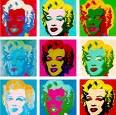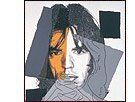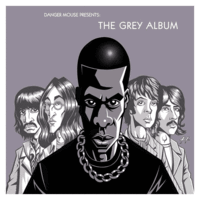 That's when it hit me -- if Andy Warhol was alive today, he would be taking images and video clips off the Web and transforming them into little snippets of art and commentary...and probably getting threatened with copyright infringement lawsuits.
That's when it hit me -- if Andy Warhol was alive today, he would be taking images and video clips off the Web and transforming them into little snippets of art and commentary...and probably getting threatened with copyright infringement lawsuits.Without strong exceptions for fair use in our copyright laws, we would have missed out on some of the most iconic images of our times...Marilyn, Mao, Mick, and the electric chair series.
Honestly, I've never been much of a Warhol fan...the Campbell's Soup thing never struck me as particularly interesting or inspired, and viewing just one of the Marilyn silkscreens left me lukewarm. But it is different seeing the images in person.
 When you see several Marilyn or Mao silkscreens together, and see how the colors change from one silkscreen to the next, but certain facial features remain constant -- with Marilyn, her lips, eyes and eyebrows...with Mao, his lips, eyes and nose -- it is much more evocative and interesting.
When you see several Marilyn or Mao silkscreens together, and see how the colors change from one silkscreen to the next, but certain facial features remain constant -- with Marilyn, her lips, eyes and eyebrows...with Mao, his lips, eyes and nose -- it is much more evocative and interesting.And Warhol's images of Mick Jagger, with their swathes of collage and color and hand-drawn lines that override parts of the silkscreened photograph...well, I found those images quite compelling...and I'm not even a Rolling Stones fan.

The original Jagger photographs were Warhol's own, but many of the images he used for his silkscreens were simply lifted from the public sphere and reworked. He culled stills from films and took photos from newspapers, magazines and press kits to use as the basis of his artwork. Today, if he copied those same images online, it would be called theft and he'd be fighting copyright infringement lawsuits instead of creating art.
 For example, how is "The Grey Album" really that different from Warhol's Marilyn and Mao series? DJ Danger Mouse's 2004 album, which mixed raps from Jay-Z's "The Black Album" with iconic rifs from The Beatles' "White Album," was ranked as best album of the year by Entertainment Weekly. In both cases, the artists took existing materials and transformed them into something new. But Danger Mouse was called a bootlegger and hit with "cease and desist" orders, while (to my knowledge) Warhol was not.
For example, how is "The Grey Album" really that different from Warhol's Marilyn and Mao series? DJ Danger Mouse's 2004 album, which mixed raps from Jay-Z's "The Black Album" with iconic rifs from The Beatles' "White Album," was ranked as best album of the year by Entertainment Weekly. In both cases, the artists took existing materials and transformed them into something new. But Danger Mouse was called a bootlegger and hit with "cease and desist" orders, while (to my knowledge) Warhol was not.In his AEJMC keynote, "Is Writing Allowed?", Lessig spoke of the flowering of digital and online creativity...of how the Web and digital media are fostering creativity among regular folks, not just artists and movie directors with Hollywood budgets. He spoke of the Web as a disruptive technology, one that's undermining the existing "Read Only" (RO) media and entertainment industry.
The Web and digital media promise to let the control of our culture pass from the tight fists of government and industries into the open hands of the rest of us. It promises to turn our world into a "Read/Write" (R/W) culture, Lessig said, where we can all create, share and consume media products.
 One of Lessig's more entertaining examples: the Bush-Blair Love Song, an inspired bit of video commentary that mixes news clips and pop music.
One of Lessig's more entertaining examples: the Bush-Blair Love Song, an inspired bit of video commentary that mixes news clips and pop music.Blogs, on the other hand, draw upon an older tradition: text. In blogs, he noted, the remix of text is free -- no permission is required. It's unregulated, and it's flourishing.
While some people say that most blogs are crap, Lessig said the real value of blogs is that millions of people regularly sit down and their ideas into their own words...and onto the net.
"I believe in copyright," Lessig said, but we forget that the original purpose of copyright law was to provide incentives to create and "permit artists to be independent of patrons." It was not to provide perpetual income for heirs and corporations.
But industry-sponsored "net neutrality" and "broadcast treaty" legislation, along with draconian enforcement of the Digital Millennium Copyright law (with almost no allowances for "fair use"), are threatening to blight that budding digital creativity.
If we continue to let our representatives legislate the Internet to death, and lacerate fair usage, we will end up making the Web safe for commercial speech and little else. And that would be a sad end for such a promising new medium.
1 comment:
A footnote to the Grey Album saga: DJ Dangermouse is one-half of the wild commercial success that is Gnarls Barkley. Mash-up sensibilities and production skills, but original music, and now 'Crazy' has been the unavoidable hit of the summer all over the world. I think the ringtone of the song might have gone to #1 on the charts in England, but check me on that.
Post a Comment